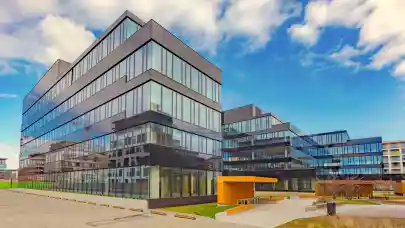
The coronavirus pandemic will transform the office property market, significantly driving demand for flex workspace solutions. In the next 12-18 months, flex formats will increase to approximately 30% of total modern office spaces in Central and Eastern Europe from 3-5% before the crisis. The winners will be landlords and operators who focus on flex office hubs which offer clients not only flex and flex & core formats but an integrated work/life service concept, according to a new report by flex space operator New Work.
COVID-19 has transformed the office property market. Overnight, office buildings have been deserted as occupants shift to home office mode. When the initial pandemic restrictions will be lifted and commercial life begins to resume, it will not be easy to convince everyone to return to their old desks. Companies both big and small will be forced to redesign layouts, decreasing density to safely place workers at least 1.5 meters apart. This will create a space shortage, and some 30% of the workforce will need to work from home or somewhere else. Some companies will not extend their leases and will migrate to ‘space in the cloud’ concepts. Renting traditional office space in these insecure times has simply become too risky, as long-term planning is impossible and funds for capital expenditures are required for immediate core business activities. These are the main conclusions of a report drafted by Hubert Abt, CEO of New Work Offices, one of the largest flex office operators in Central and Eastern Europe, and Michael Smithing the company’s CDO.
People will be afraid to return to co-working facilities
“Post COVID-19, flexible offices will constitute as much as 30% of all office spaces available in Central and Eastern Europe. Before the crisis, this figure was only 3-5%,” says Hubert Abt. “Operators and landlords who are able to provide the necessary scale of flex solutions across a range of formats including ‘core & flex’ and ‘space in the cloud’ - with a wide variety of services and new technologies - will be the winners. However, not all market players will be able to adjust to the new reality, particularly those which lack the scale or sufficient equity to finance the necessary transformation. We expect that up to 50% of the flex office operators currently present in Central and Eastern Europe will disappear, first gradually and then suddenly”

Hubert Abt
CEO / Principal
New Work Offices
Such entities include operators of “co-working only” formats. Their tenants are frequently small companies with short-term agreements who fled at the start of the pandemic to reduce overhead. After COVID-19, it will be hard to convince such clients to return to offices with limited private space. People will simply be afraid of working so close to each other. For perhaps the first time in history, the average area per workstation will increase. Over the past 20 years, cost-saving has reduced the average area per workstation from 20 to 7 sqm per person, which will now bounce back up to around 10 sqm as companies adopt what Cushman & Wakefield calls the 6 Feet Office.
Smaller companies and corporations are bound to demand new solutions
Clients negotiating the new reality created by the COVID-19 pandemic will be more interested in virtual offices. These provide companies with a reception and administration services, meeting rooms, a mailing address and on-demand office space in a pay as you go model that is particularly attractive to microenterprises and small companies who require quality, cost-effective office space solutions.
“In the post-pandemic reality, we will witness a shift in the approach of big companies” predicts Michael Smithing. “To minimize business risk and reduce costs, they will rapidly implement ‘core & flex’ solutions which combine the certainty of a traditional lease with the advantage of flex space. The part of the workforce which uses the office part-time, like sales, will not have dedicated desks in expensive city-centre locations, but will have access to space on demand, both at headquarters and in different locations across the city and country provided by their flex office operator.”
As part of the ‘core & flex’ transformation, satellite offices will gain popularity, hence the winners will be those flex operators who are in the position to offer multiple locations across different cities and countries.
The future lies with business hubs
The report by New Work suggests that flex office hubs offering a range of formats including flex, core & flex and hotdesking solutions will be needed to deliver on client expectations. Such venues, with sizes ranging from 3 to 10 thousand square meters, will provide a broad range of services. Their lobbies will never be empty; rather they will be marketplaces with all sort of services including space for formal and informal meetings, courier and food delivery boxes, concierge and laundry services, ATMs, coffee and sandwich bars as well building access kiosks.
“They will include kindergartens, gyms and electric scooter and bike rental stations that you can use to get to the nearest public transport hub” explains Hubert Abt. “Such buildings will also feature outdoor sports grounds and a barbecue spot which clients can use as needed. The office space will be dynamically apportioned among companies to optimize utilization and meet demand in the most cost-effective manner possible.
As such, flexible business hubs will be a perfect solution for big companies with dedicated spaces, but also for small business owners using virtual offices and paying only for the resources actually used.
New technology-driven
Flexible Office Hubs designed to this concept be available in multiple locations in each city, country and in some cases globally. Customers will be entitled to access all these sites with a membership card provided by their flex office operator. New technologies will be of immense importance in this scenario to assure consistent, personal service and provide a personally branded office experience across a range of spaces.



